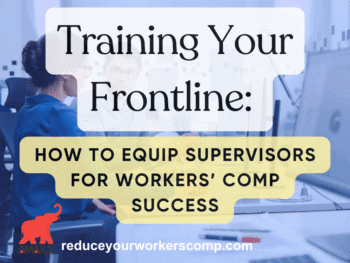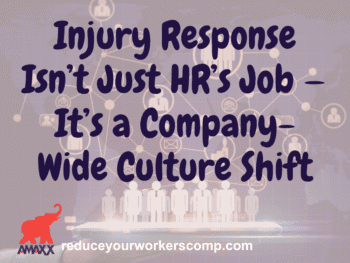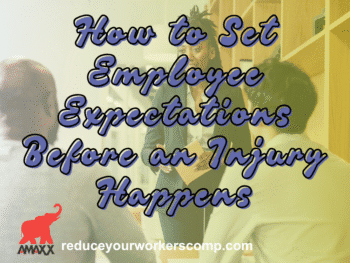Fear, silence, and uncertainty do more to drive workers’ compensation costs than is generally appreciated – and these factors are fairly simple to control through employer involvement. Attorneys in the field quickly learn that an unpaid medical bill is certain to drive a worker to a lawyer, but there are many other fears which will also do the same thing. Job security is perhaps the second greatest fear, but much else can cause dangerous anxiety. Your workers will quickly find themselves worrying about problems which don’t exist and can’t exist, but these problems will be very real unless someone communicates with them.
Click Link to Access Free PDF Download
“9-Element Blueprint To Create Your Workers’ Comp Employee Brochure”
Employer Needs to Maintain Communication
The employer does not have to be a counselor or advocate to control such stress, it just needs a credible reason to maintain direct communication. Other laws, OSHA, DOT, FMLA, contain provisions for employer directed medical examinations which are separate from workers’ compensation. These demonstrate the employer’s concern and can be performed days after an injury is reported.
If an employee’s disability extends for more than a few days, a phone call at reasonable intervals to inquire about any difficulties in obtaining proper medical care or simply in purchasing food service as an excellent way to maintain contact.
The employer should be aware that many workers live alone and even one week at home can be a difficult experience. Also, the employee will be communicating with a new and often mysterious group of individuals that are inevitably part of the claim process – claims examiners, medical office personnel, state boards, and lawyers. Each of these will be speaking to them in unfamiliar technical terms.
The employer, who has been through previous workers’ compensation claims, can serve as an interpreter. The employer can also answer many related questions, especially with regard to short-term disability if the claim should be contested.
Employee’s Spouse Is Your Greatest Ally
The employer will also be able to answer most of the concerns of the spouse. Disability is a family problem and the spouse is your best ally. Spouses do NOT generally favor extended disability and will do more to make a return to work effort succeed than an entire team of vocational rehab experts. Never cut off communication with such a valuable friend.
In short, silence is the worst enemy of an effective disability management program.
Author: Attorney Theodore Ronca is a practicing lawyer from Aquebogue, NY. He is a frequent writer and speaker, and has represented employers in the areas of workers’ compensation, Social Security disability, employee disability plans and subrogation for over 30 years. Attorney Ronca can be reached at 631-722-2100. medsearch7@optonline.net
©2016 Amaxx Risk Solutions, Inc. All rights reserved under International Copyright Law.
Do not use this information without independent verification. All state laws vary. You should consult with your insurance broker, attorney, or qualified professional.



























